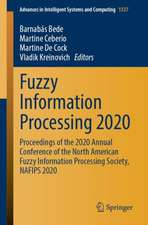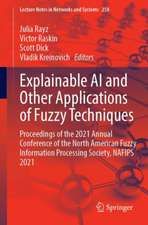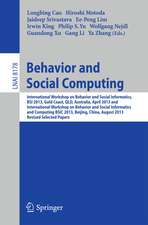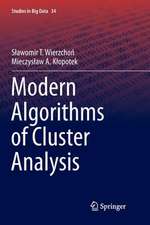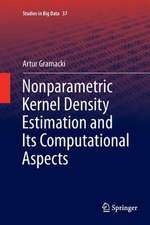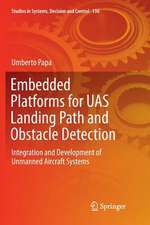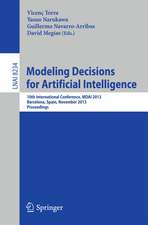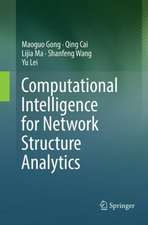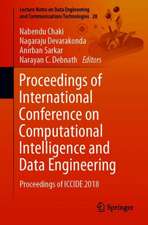Artificial Intelligence in Control and Decision-making Systems: Dedicated to Professor Janusz Kacprzyk: Studies in Computational Intelligence, cartea 1087
Editat de Yuriy P. Kondratenko, Vladik Kreinovich, Witold Pedrycz, Arkadii Chikrii, Anna M. Gil-Lafuenteen Limba Engleză Hardback – 18 apr 2023
Dedicated to the Academician of the Polish Academy of Sciences, Professor Janusz Kacprzyk in recognition of his pioneering work, the book reports on theories, methods and new challenges in artificial intelligence, thus offering not only a timely reference guide but also a source of new ideas and inspirations for graduate students and researchers alike.
The book consists of the 18 chapters, presented by distinguished and experienced authors from 16 different countries (Australia, Brazil, Canada, Chile, Germany, Hungary, Israel, Italy, China, R.N.Macedonia, Saudi Arabia, Spain, Turkey, United States, Ukraine, and Vietnam). All chapters are grouped into three parts: Computational Intelligence and Fuzzy Systems, Artificial Intelligence Techniques in Modelling and Optimization, and Computational Intelligence in Control and Decision Support Processes.
The book reflects recent developments and new directions in artificial intelligence, including computation method of the interval hull to solutions of interval and fuzzy interval linear systems, fuzzy-Petri-networks in supervisory control of Markov processes in robotic systems, fuzzy approaches for linguistic data summaries, first-approximation analysis for choosing fuzzy or neural systems and type-1 or type-2 fuzzy sets, matrix resolving functions in game dynamic problems, evolving stacking neuro-fuzzy probabilistic networks and their combined learning in online pattern recognition tasks, structural optimization of fuzzy control and decision-making systems, neural and granular fuzzy adaptive modeling, state and action abstraction for search and reinforcement learning algorithms.
Among the most successful and perspective implementations in practical areas of human activity are tentative algorithms for neurological disorders, human-centric question-answering system, OWA operators in pensions, evaluation of the perception of public safety through fuzzy and multi-criteria approach, a multicriteria hierarchical approach to investment location choice, intelligent traffic signal control and generative adversarial networks in cybersecurity.
Din seria Studies in Computational Intelligence
- 50%
 Preț: 264.48 lei
Preț: 264.48 lei - 70%
 Preț: 235.75 lei
Preț: 235.75 lei - 20%
 Preț: 1124.99 lei
Preț: 1124.99 lei - 20%
 Preț: 958.34 lei
Preț: 958.34 lei - 20%
 Preț: 938.60 lei
Preț: 938.60 lei - 20%
 Preț: 1411.01 lei
Preț: 1411.01 lei - 20%
 Preț: 168.78 lei
Preț: 168.78 lei - 18%
 Preț: 1080.35 lei
Preț: 1080.35 lei - 20%
 Preț: 630.67 lei
Preț: 630.67 lei - 20%
 Preț: 1017.64 lei
Preț: 1017.64 lei - 20%
 Preț: 1533.56 lei
Preț: 1533.56 lei - 20%
 Preț: 625.07 lei
Preț: 625.07 lei - 20%
 Preț: 638.66 lei
Preț: 638.66 lei - 20%
 Preț: 964.76 lei
Preț: 964.76 lei - 20%
 Preț: 962.36 lei
Preț: 962.36 lei - 20%
 Preț: 961.55 lei
Preț: 961.55 lei - 20%
 Preț: 1132.20 lei
Preț: 1132.20 lei - 20%
 Preț: 1402.98 lei
Preț: 1402.98 lei - 20%
 Preț: 1012.03 lei
Preț: 1012.03 lei - 20%
 Preț: 1017.64 lei
Preț: 1017.64 lei - 20%
 Preț: 1016.01 lei
Preț: 1016.01 lei - 18%
 Preț: 2428.53 lei
Preț: 2428.53 lei - 20%
 Preț: 960.73 lei
Preț: 960.73 lei - 20%
 Preț: 1132.20 lei
Preț: 1132.20 lei - 20%
 Preț: 1130.62 lei
Preț: 1130.62 lei - 20%
 Preț: 1012.84 lei
Preț: 1012.84 lei - 20%
 Preț: 1418.19 lei
Preț: 1418.19 lei - 18%
 Preț: 1363.19 lei
Preț: 1363.19 lei - 18%
 Preț: 1092.61 lei
Preț: 1092.61 lei - 20%
 Preț: 1009.63 lei
Preț: 1009.63 lei - 20%
 Preț: 979.17 lei
Preț: 979.17 lei - 20%
 Preț: 1015.25 lei
Preț: 1015.25 lei - 20%
 Preț: 1238.77 lei
Preț: 1238.77 lei - 20%
 Preț: 1010.44 lei
Preț: 1010.44 lei - 20%
 Preț: 959.96 lei
Preț: 959.96 lei - 20%
 Preț: 1136.19 lei
Preț: 1136.19 lei - 20%
 Preț: 1128.98 lei
Preț: 1128.98 lei - 20%
 Preț: 1028.84 lei
Preț: 1028.84 lei - 20%
 Preț: 1130.62 lei
Preț: 1130.62 lei - 20%
 Preț: 1133.01 lei
Preț: 1133.01 lei - 20%
 Preț: 1417.44 lei
Preț: 1417.44 lei - 18%
 Preț: 976.87 lei
Preț: 976.87 lei - 20%
 Preț: 968.75 lei
Preț: 968.75 lei - 20%
 Preț: 1025.63 lei
Preț: 1025.63 lei - 20%
 Preț: 965.53 lei
Preț: 965.53 lei - 20%
 Preț: 1018.61 lei
Preț: 1018.61 lei - 20%
 Preț: 916.69 lei
Preț: 916.69 lei - 20%
 Preț: 1139.41 lei
Preț: 1139.41 lei - 20%
 Preț: 1415.80 lei
Preț: 1415.80 lei - 20%
 Preț: 1015.25 lei
Preț: 1015.25 lei
Preț: 1136.04 lei
Preț vechi: 1420.05 lei
-20% Nou
Puncte Express: 1704
Preț estimativ în valută:
217.44€ • 226.62$ • 181.01£
217.44€ • 226.62$ • 181.01£
Carte tipărită la comandă
Livrare economică 04-18 ianuarie 25
Preluare comenzi: 021 569.72.76
Specificații
ISBN-13: 9783031257582
ISBN-10: 3031257588
Pagini: 388
Ilustrații: XVII, 388 p. 118 illus., 56 illus. in color.
Dimensiuni: 155 x 235 mm
Greutate: 0.74 kg
Ediția:2023
Editura: Springer Nature Switzerland
Colecția Springer
Seria Studies in Computational Intelligence
Locul publicării:Cham, Switzerland
ISBN-10: 3031257588
Pagini: 388
Ilustrații: XVII, 388 p. 118 illus., 56 illus. in color.
Dimensiuni: 155 x 235 mm
Greutate: 0.74 kg
Ediția:2023
Editura: Springer Nature Switzerland
Colecția Springer
Seria Studies in Computational Intelligence
Locul publicării:Cham, Switzerland
Cuprins
Method for the Computation of the Interval Hull to Solutions of Interval and Fuzzy Interval Linear Systems.- Fuzzy-Petri-Networks in Supervisory Control of Markov Processes in
Robotized FMS and Robotic Systems.- Using Fuzzy Set Approaches for Linguistic Data Summaries.- Fuzzy or Neural, Type-1 or Type-2 – When Each Is Better: First-Approximation Analysis.
Robotized FMS and Robotic Systems.- Using Fuzzy Set Approaches for Linguistic Data Summaries.- Fuzzy or Neural, Type-1 or Type-2 – When Each Is Better: First-Approximation Analysis.
Textul de pe ultima copertă
This book presents an authoritative collection of contributions reporting on computational intelligence, fuzzy systems as well as artificial intelligence techniques for modeling, optimization, control and decision-making together with applications and case studies in engineering, management and economic sciences.
Dedicated to the Academician of the Polish Academy of Sciences, Professor Janusz Kacprzyk in recognition of his pioneering work, the book reports on theories, methods and new challenges in artificial intelligence, thus offering not only a timely reference guide but also a source of new ideas and inspirations for graduate students and researchers alike.
The book consists of the 18 chapters, presented by distinguished and experienced authors from 16 different countries (Australia, Brazil, Canada, Chile, Germany, Hungary, Israel, Italy, China, R.N.Macedonia, Saudi Arabia, Spain, Turkey, United States, Ukraine, and Vietnam). All chapters are grouped into three parts: Computational Intelligence and Fuzzy Systems, Artificial Intelligence Techniques in Modelling and Optimization, and Computational Intelligence in Control and Decision Support Processes.
The book reflects recent developments and new directions in artificial intelligence, including computation method of the interval hull to solutions of interval and fuzzy interval linear systems, fuzzy-Petri-networks in supervisory control of Markov processes in robotic systems, fuzzy approaches for linguistic data summaries, first-approximation analysis for choosing fuzzy or neural systems and type-1 or type-2 fuzzy sets, matrix resolving functions in game dynamic problems, evolving stacking neuro-fuzzy probabilistic networks and their combined learning in online pattern recognition tasks, structural optimization of fuzzy control and decision-making systems, neural and granular fuzzy adaptive modeling, state and action abstraction for search and reinforcement learning algorithms.
Among the most successful and perspective implementations in practical areas of human activity are tentative algorithms for neurological disorders, human-centric question-answering system, OWA operators in pensions, evaluation of the perception of public safety through fuzzy and multi-criteria approach, a multicriteria hierarchical approach to investment location choice, intelligent traffic signal control and generative adversarial networks in cybersecurity.
Dedicated to the Academician of the Polish Academy of Sciences, Professor Janusz Kacprzyk in recognition of his pioneering work, the book reports on theories, methods and new challenges in artificial intelligence, thus offering not only a timely reference guide but also a source of new ideas and inspirations for graduate students and researchers alike.
The book consists of the 18 chapters, presented by distinguished and experienced authors from 16 different countries (Australia, Brazil, Canada, Chile, Germany, Hungary, Israel, Italy, China, R.N.Macedonia, Saudi Arabia, Spain, Turkey, United States, Ukraine, and Vietnam). All chapters are grouped into three parts: Computational Intelligence and Fuzzy Systems, Artificial Intelligence Techniques in Modelling and Optimization, and Computational Intelligence in Control and Decision Support Processes.
The book reflects recent developments and new directions in artificial intelligence, including computation method of the interval hull to solutions of interval and fuzzy interval linear systems, fuzzy-Petri-networks in supervisory control of Markov processes in robotic systems, fuzzy approaches for linguistic data summaries, first-approximation analysis for choosing fuzzy or neural systems and type-1 or type-2 fuzzy sets, matrix resolving functions in game dynamic problems, evolving stacking neuro-fuzzy probabilistic networks and their combined learning in online pattern recognition tasks, structural optimization of fuzzy control and decision-making systems, neural and granular fuzzy adaptive modeling, state and action abstraction for search and reinforcement learning algorithms.
Among the most successful and perspective implementations in practical areas of human activity are tentative algorithms for neurological disorders, human-centric question-answering system, OWA operators in pensions, evaluation of the perception of public safety through fuzzy and multi-criteria approach, a multicriteria hierarchical approach to investment location choice, intelligent traffic signal control and generative adversarial networks in cybersecurity.
Caracteristici
Provides an overview of important problems in the areas of AI and control and decision-making systems design Presents advanced techniques of Computational Intelligence Is dedicated to Professor Janusz Kacprzyk







